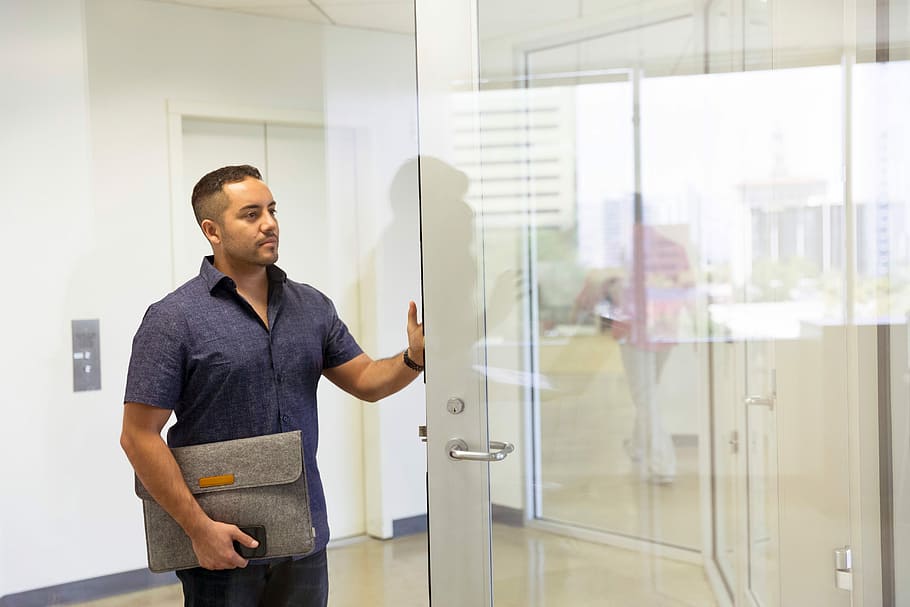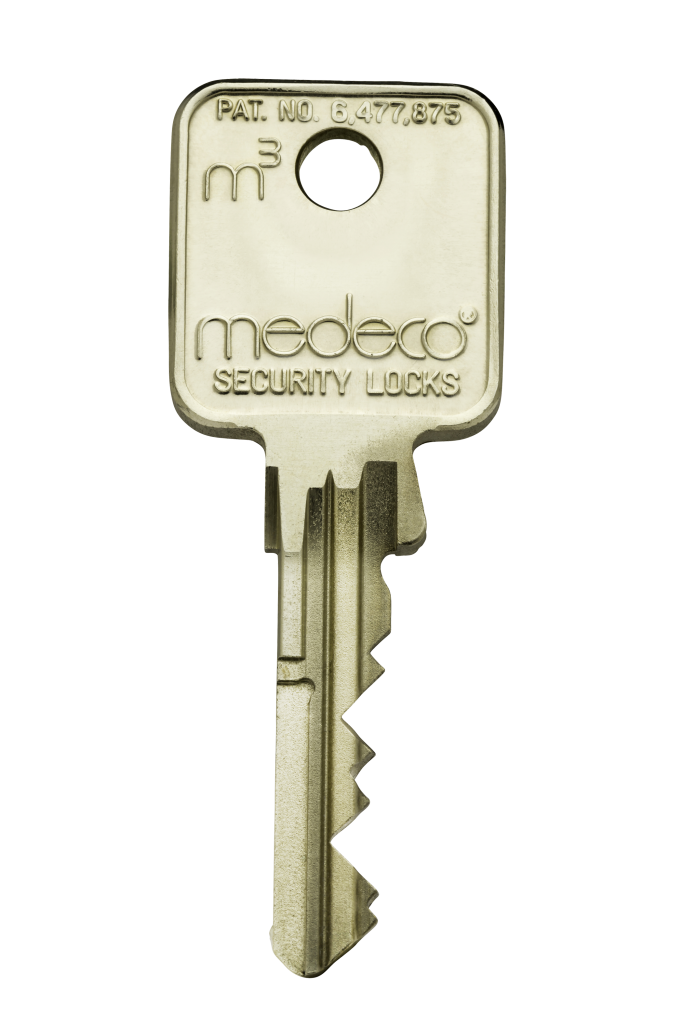Over the last couple decades, we’ve provided customers with the best in electronic and mechanical security. Due to recent technological advances in the industry, electronic security has gained most of the attention lately. However, we still place a strong emphasis on the mechanical side of our business. In fact, we surprise many people by telling them we started out as locksmiths! In addition to installing strong locking hardware, we also greatly enhance our customers’ key security. Key security has long remained one of the most under-valued aspects of overall commercial security. After all, it doesn’t matter if you have strong locks if the wrong people get a key. Today, we detail how we can add this security for you by adding master key security to your property.
First, we’ll explain the concept behind this powerful security solution. This will include a description of the different keying levels that these systems include. Then, we’ll dive into the ins and outs of master key system design. As part of this discussion, we’ll explain how under-planning can lead to issues down the road. Finally, we’ll focus on the extra key security provided by companies — such as ourselves — who offer key control security when creating master key systems. Now, let’s dive in and see how master key systems improve your security.
Understanding Master Key Systems
When we work with customers to create master key security, we have a couple goals in mind. First and foremost, we want to limit an individual’s access to the proper areas of the building. Most workers should not have access to managerial areas of the building at all times, for example. Moreover, individual workers should only have access to their office. Master key systems create this security. Additionally, we also want to hand out the fewest amount of keys possible. Instead of giving out a front door key, we’d rather provide one customized key for each worker. In the next few sections, we break down exactly how we make this happen.
Master Keys
Of course, there could be no master key system without master keys. So what exactly do these keys do? Simply put, a master key generally works every key at a given location. Due to its name, many people assume that only one key fits under the “master key” umbrella. However, we can design a few different types of keys that still hold this designation. For example, “grandmaster” keys serve as master keys for multiple locations. These keys will come up again in our section on master key system expansion. Additionally, we often create “sub-master” keys for locations with more than one building. Sprawling commercial locations such as apartment complexes and golf courses often require these keys. While a sub-master key can work as a master key for one building, it does not work every key on the entire premises the way a master key does. Now, let’s examine a couple other types of keys below the master key level, starting with change keys.

We often create change keys that provide both site access and office access with a single key.
Change Keys
Change keys represent keys that offer limited access to a site’s doors. Often, these keys will work a single office within a business, as well as the doors required to reach this office and any other common areas within the building. For example, one employee’s change key could work the exterior doors of the building, the break room, and one office. Every employee could receive a key that opens their own office, as well as the common doors that everyone uses. Master keys and change keys make up two very important layers to a master key system. Next, let’s take a look at how we can “cross-cut” keys to give business owners even more flexibility in how they design their key systems.
Cross-Cut Keys
Sometimes, business owners may wish to provide a few keys that “cut across” the various types of keys that will define their master key system. These keys often go to part-time personnel or contractors who require a unique level of access to the building. For example, schools may offer change keys to teachers that give them access to the building and to an individual classroom. However, a custodian may need a key that opens every classroom door as well as one exterior door. Rather than provide a master key that lets someone into every door on the school’s campus, we would want to cross-cut a key that provides precisely the right access level.
Unlike change keys, we must plan for the need for these keys while designing the master key system. To use the same example from above, if we make 12 change keys that each unlock an exterior door and a classroom, we can continue creating new change keys as classrooms are added to the system one by one, provided we created room in the initial system design for extra classrooms. However, if we wanted to create a key that unlocked all of the classroom doors, we would need to know that before we created the system and began cutting keys. For that reason, make sure to consider the possibility for these unique keys while designing your master key system. Speaking of future-proofing your master key system, let’s look at the role that planning potential system expansion plays in the creation process.
Avoiding Key System Design Pratfalls
When designing a master key system, it is very important to know how large the system may grow. Failing to do so could make for an expensive re-key and re-mapping of the entire master system to allow it to expand. For example, a business owner with two buildings will want to factor both locations into the initial master key system. This will allow a system “grandmaster” key to work both locations. From there, we can create master keys for both locations, and continue designing the system’s change keys.
Likewise, creating a system with a small number of levels will not allow us to add additional levels later on. Once the system’s “ceiling” is created it cannot be moved. For example, some people create master key systems with only one or two levels below the master key level, such as a master level for managerial staff and an employer level that keeps people out of certain areas. At this point, if you’ve failed to create additional levels, you cannot add them without starting all over and re-keying every door on site. For this reason, we work carefully with customers to design master key security that will fit both their present and their potential future security needs. Now, let’s see how adding key control to your master key system can supercharge your key security!

Keys that provide key control. such as those that work with Medeco locks, help you track and limit access to keys.
Taking Advantage of Key-Controlled Key Systems
Many people are unaware that keys come in a variety of “types” and styles. After all, keys all serve the same basic purpose of unlocking doors, right? Well, it turns out that business owners have more options with their keys than they often realize. Keys are made with different levels of security and access in mind. High-quality locks, such as our preferred locks made by Medeco, require high-security keys to unlock them. These locks have anti-burglar technology that makes them difficult to breach with drilling or picking attacks. Because of the technology built into the locks to prevent being compromised, they also require a robust, high-security key to properly operate them. While lower-grade locks with standard keys may work for some businesses, we recommend high-security lock hardware and keys whenever security is important.
Additionally, some key manufacturers — including Medeco — feature “key control” products. Key control systems allow business owners to decide who can make copies of keys. Remember that even the best locks only keep out those who do not have keys. Therefore, keeping keys out of the wrong hands is extremely important. When copying a key that is part of a key control system, customers must show identification. If their ID matches up with an “approved” individual, they can receive a copy of the key. If not, they get turned away without a new key. This keeps employees leaving a job from copying their office keys before turning them in. We highly recommend that anyone creating master key security incorporate key control security measures as well.
Making Master Key Security Work for You
We hope that this post helps you design your own effective master key system. Moreover, we also encourage you to contact us with any questions this post may raise for you. We will happily answer any and all of your security-related inquiries. Furthermore, we’ll even stop out and provide a free site survey for you! During our visit, we can address your existing security concerns. Additionally, we can make suggestions of our own based on observations of your property. We’ve worked with over a thousand customers over 35 years in business to create the security solutions that work for every unique application. Together, we can create a complete security plan to keep your property — and everyone on it — as safe and secure as possible.
